Ishigaki Island
Ishigaki Island (石垣島, Ishigaki-jima, Yaeyama: Ishanagï, Okinawan: Ishigachi), also known as Ishigakijima, is a Japanese island south-west of Okinawa Hontō and the second-largest island of the Yaeyama Island group, behind Iriomote Island. It is located approximately 411 km (255 mi) south-west of Okinawa Hontō.[1] It is within the City of Ishigaki in Okinawa Prefecture. The city functions as the business and transport center of the archipelago. The island is served by New Ishigaki Airport, the largest airport in the Yaeyamas.
Native name: Ishigaki-jima (石垣島) | |
|---|---|
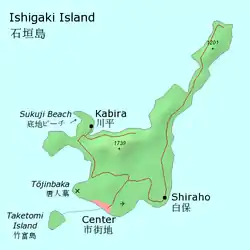 | |
 Ishigaki | |
| Geography | |
| Location | Pacific Ocean |
| Coordinates | 24.44°N 124.22°E |
| Archipelago | Yaeyama Islands |
| Area | 222.24[1] km2 (85.81 sq mi) |
| Highest elevation | 525.5 m (1724.1 ft) |
| Highest point | Mount Omoto |
| Administration | |
| Prefecture | Okinawa Prefecture |
| Demographics | |
| Population | 47,564[1] (January 2019) |
| Ethnic groups | Ryukyuan, Japanese |
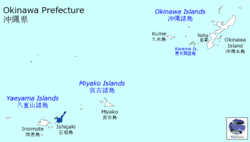
Much of the island and surrounding waters including Mount Omoto and Kabira Bay are protected as part of Iriomote-Ishigaki National Park.[2]
Ishigaki Island, like the rest of Okinawa, is culturally influenced by both Japan and Taiwan due to its location, about 300 km (186 mi) off the north eastern coast of Taiwan.
History
A tsunami of record height hit Ishigaki Island in 1771.[3]
One of the perpetrators of Aum Shinrikyo's sarin gas attack, Yasuo Hayashi, was arrested on Ishigaki Island 21 months after the attacks and 2,000 km (1,243 mi) from the scene of the crime.
Ishigaki Port
Located 400 km (249 mi) southwest of Okinawa Island and 259 km (161 mi) east of Keelung, Ishigaki serves as a gateway to the Yaeyama Islands. Ishigaki Port is the 5th most popular of Japan's cruise ports as of 2017, and 4th for port calls by non-Japanese ships with a weekly call by Star Cruises from Taiwan. Several companies offer daily ferry service to Hateruma, Iriomote, Kohama, and Taketomi Island.[5]
Due to Japan's increased focus on grey-zone challenges, Ishigaki Port has been expanded so more than a dozen large (over 1,000 tons) Japan Coast Guard ships can be stationed there. There are currently 11 Kunigami-class large patrol vessels and 2 Hateruma-class large patrol vessels, as well as a Bizan-class small patrol vessel, and a Kagayuki-class patrol craft have been homeported at Ishigaki along with facilities for housing up to 600 crew, making Ishigaki JCG's largest base, surpassing JCG's facilities in Yokohama.[6][7][8]
Tokyo has currently earmarked ¥21.2 billion yen (US$205 million) in FY2021 to build new patrol boats and buy helicopters for the region, with plans to assign 22 ships of over 1,000 tons (including the 3 Tsugarus, a Kunigami, and a Hateruma class patrol vessel based in Naha) in the region by 2024. Tokyo has also bulked up the JCG presence on Miyako-jima between Ishigaki and Naha with nine Shimoji-class small patrol vessels and a Tokara-class medium patrol vessel[9]
The Japan Self-Defense Forces (JSDF) are also considering deploying short range anti-ship missiles[10] (possibly the Type 96 Multi-Purpose Missile System) on the island.
These reinforcements are mostly in relation to the Japanese uninhabited Senkaku Islands, which lie 170 km (106 mi) north of Ishigaki and are under the control of the mayor of Ishigaki, which has been given civic authority over the territory since the Senkaku Islands reverted from the US to the Japanese government control in 1972. China (People's Republic of China), and to lesser extent Taiwan (Republic Of China), have challenged Japan's sovereignty over these islands since 1972, with more intensity since 2012.
.jpg.webp) Ishigaki port
Ishigaki port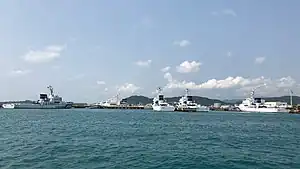 Japan Coast Guard vessels at Port of Ishigaki
Japan Coast Guard vessels at Port of Ishigaki
Culture
- Miyaradunchi is a residence erected around 1819 by the local governor, it has been designated an Important Cultural Property as representative of the architecture of the Yaeyama Islands.[11][12]
Food
Ishigaki has different cuisine from mainland Japan. Due to the relative warmth of the surrounding sea and various cultural influences, the food of Ishigaki and Okinawa is more meat-centered than the rest of Japan. The Ryukyu Kingdom served as an important trading post between Japan and the rest of the world despite various trading bans between Japan and China.
Located only 244 km (152 mi) from Taiwan, Okinawan cuisine is best defined by the Okinawan word Chanpurū (チャンプルー) or "something mixed", incorporating aspects of Chinese, Japanese, Southeast Asian, and American cultures. Although Okinawa is best known for its love of pig, Ishigaki is famous for its Japanese Black cattle, both which are thought to have originally been brought from China as far back as the Yayoi period. Ishigaki is also unique in its use of spice and tropical fruits mainland Japanese palates tend to be unaccustomed with.[13][14][15]
Flora
Satakentia liukiuensis, the only species in the genus Satakentia, is a palm tree that is endemic to the two islands of Ishigaki and Iriomote in the Yaeyama Islands.[16]
Gallery
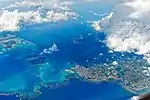 Aerial view of Ishigaki island, Taketomi and Kohama island, 2014
Aerial view of Ishigaki island, Taketomi and Kohama island, 2014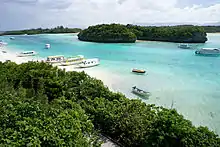 Kabira Bay
Kabira Bay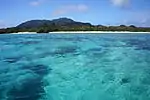 Kabira Bay
Kabira Bay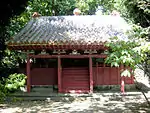 Torinji Gongendo- Buddhist temple
Torinji Gongendo- Buddhist temple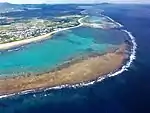 Shiraho coral reef
Shiraho coral reef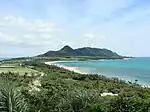 Hirakubo Peninsula
Hirakubo Peninsula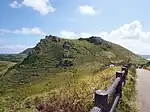 Hirakubo
Hirakubo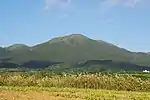 Mount Omoto
Mount Omoto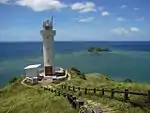 Hirakubosaki lighthouse
Hirakubosaki lighthouse Ishigaki Island from space
Ishigaki Island from space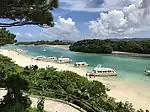 Kabira Bay
Kabira Bay
See also
References
- "Remote island related materials (離 島 関 係 資 料)" (PDF). Archived (PDF) from the original on 2020-02-15. Retrieved 2020-02-15.
- "Introducing places of interest: Iriomote-Ishigaki National Park (Ishigakijima)". Ministry of the Environment. Archived from the original on 20 April 2012. Retrieved 15 February 2012.
- 「宮古八重山津波」(1771 年) における災害・年貢・復興について —石垣島と多良間島を中心に—」 Archived 2016-05-05 at the Wayback Machine 豊見山和行 (Tomiyama, Kazuyuki) University of the Ryukyus Repository (Retrieved on May 13, 2009) (in Japanese) Index Archived 2016-05-05 at the Wayback Machine (Retrieved on May 13, 2009)
- "2017 Asia Cruise Trends" (PDF). cruising.org. Cruise Lines International Association. Retrieved 15 June 2021.
- Sato, Yuji (18 October 2016). "The Japan Coast Guard protects the Senkaku Islands to the last". Japan Foreign Policy Forum. Retrieved 14 June 2021.
- Saitō, Katsuhisa (26 April 2021). "The Senkaku Confrontation: Japan's Coast Guard Faces Chinese "Patrol Ships"". Nippon Communications Foundation. Retrieved 14 June 2021.
- "Japan Coast Guard to form 600-member unit tasked solely with patrolling Senkakus."
- Kanaya, Shohei (23 December 2020). "Japan to bulk up Senkaku patrols as more Chinese ships enter area". Nikkei, Inc. Retrieved 27 June 2021.
- "Self-Defense Forces gear up for large-scale war games on remote isle" (The Japan Times/AFP-JIJI)
- "旧宮良殿内(沖縄県石垣市大川)". Agency for Cultural Affairs. Retrieved 15 February 2012.
- "宮良殿内庭園". Agency for Cultural Affairs. Archived from the original on 7 July 2012. Retrieved 15 February 2012.
- "Okinawa: Travel to Japan's tropical southern end". CNN Travel. Retrieved 15 June 2021.
- "石垣牛の料理". kyoudo-ryouri.com. Retrieved 15 June 2021.
- Leung Hayes, Janice (22 Aug 2019). "Japanese island famous for chilli oil is a favourite for Asian foodies". South China Morning Post. Retrieved 15 June 2021.
- Dransfield, John; Uhl, Natalie W.; Asmussen, Conny B.; Baker, William J.; Harley, Madeline M.; Lewis, Carl E. (2008). Genera Palmarum: The Evolution and Classification of Palms. Royal Botanic Gardens, Kew. ISBN 978-1-84246-182-2.
External links
- Guide for Ishigaki island (in English and Dutch)
- Ishigaki island vacation activities (in English)
- English language guide to Ishigaki island
- Ishigaki City official website